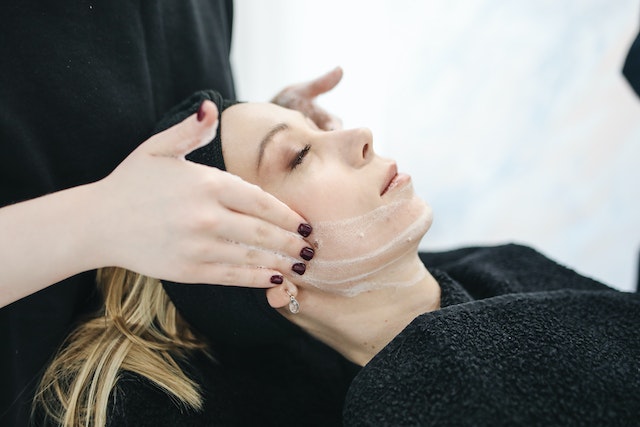If you’re like most people, you want to have healthy and beautiful skin. But sometimes it can be hard to know how to take care of your skin properly. That’s why we’ve asked some of the top professionals in the field for their tips on taking care of your skin!  Keep reading for advice from dermatologists, estheticians, and more on how to get the best skin of your life!
Keep reading for advice from dermatologists, estheticians, and more on how to get the best skin of your life!
1. Use Sunscreen Every Day
Sunscreen is your number one tool for protecting your skin from damage caused by UV rays. Make sure to apply a broad-spectrum sunscreen with SPF 30 or higher every day, even on cloudy days and during winter months when you’re not in direct sunlight. For example, the sun’s rays can reflect off the snow and damage your skin! Also, don’t forget to reapply your sunscreen every two hours if you’re spending a lot of time outdoors.
2. Keep Your Skin Hydrated
Your skin needs hydration in order to stay healthy and look its best. Make sure to drink plenty of water throughout the day, and use moisturizers that are specifically formulated for your skin type (oily, dry, combination, etc.). Moisturizing helps protect your skin from environmental factors like pollution and keeps it supple and nourished.
3. Exfoliate Regularly
Exfoliating is important for keeping your skin clear by removing dead skin cells that can clog pores and cause breakouts. You should exfoliate at least once a week with an exfoliating scrub that’s formulated for your skin type. Make sure to be gentle with your exfoliation, since over-exfoliating can cause irritation and redness. In addition to exfoliating, use a mild face wash daily to keep your skin clean and clear.
4. Cleanse your face properly:
Cleansing your face on a regular basis can help prevent breakouts and keep your skin looking healthy. Make sure to use a cleanser that’s specifically made for your skin type, and be sure to use lukewarm (not hot) water when washing your face. It’s also important to avoid scrubbing too harshly or using harsh cleansers since these can strip away the natural oils in your skin. Professionals recommend that you use fruit-based cleansers because they are mild and suitable for any skin type. So don’t forget to choose the right cleanser for better skin care.
5. Get Enough Sleep:
Getting enough sleep is one of the most important things you can do for your skin. When you don’t get adequate rest, it’s reflected in your complexion — with dark circles, puffiness, and a dull overall look. Aim to get 7-8 hours of sleep every night so that your body has time to repair itself and produce healthy collagen and elastin (two proteins that give your skin its structure).
6. Don’t forget about eye care:
The skin around the eyes is delicate, so it’s important to take proper care of it! Use an eye cream that contains ingredients like retinol and hyaluronic acid to help reduce puffiness and dark circles. In addition, make sure not to pull at the delicate skin around the eyes when removing eye makeup. Gentle tapping motions are best for this area. For instance, use a cotton pad soaked in makeup remover and gently tap the area until all of your makeup is removed.
7. Invest in Quality Products
Investing in quality skincare products can make all the difference when it comes to taking care of your skin. Look for products that are specifically formulated for your skin type and contain ingredients like antioxidants, vitamins, and hyaluronic acid, which help protect and nourish your skin. Also, read reviews before buying any product so you know what other people think about it!
8. Avoid Stressful Situations
Stress can have a huge impact on your skin health, so it’s important to try and reduce stress as much as possible. Take time out of every day for yourself – listen to music, read a book, or just sit and relax. Even something as simple as taking a few deep breaths can help reduce stress levels. Also, make sure to get enough sleep and exercise regularly.
9. Use Retinol and Vitamin C
Retinols (vitamin A derivatives) and vitamin C can help improve the overall health of your skin by boosting collagen production and reducing wrinkles. Retinols are great for anti-aging, while vitamin C helps protect against free radicals (which cause premature aging). Both should be used in moderation to avoid over-drying the skin.
By following these tips from the pros, you’ll be on your way to taking better care of your skin and having a healthier, more radiant complexion! Make sure to consult with a dermatologist if you have any questions or concerns about taking care of your skin.
Related Posts:
- An Overview of Morpheus8 Anti-Aging Skin Treatment: Is It Right For You?
- 3 Ingredients In Anti-Aging Supplements That Promote Healthy Aging
- 5 Benefits of Anti Aging Supplements
- Restore Your Receding Hairline And Aging Skin With PepFactor
- Skin Elasticity: Know What It Is And How To Restore It
- Positively Glowing: How To Properly Exfoliate Your Skin
- How to Take Care of Your Skin After the 30s
- Vitamins and Proteins That Support Skin Health
- Self-Care Trends To Look Out for in 2023